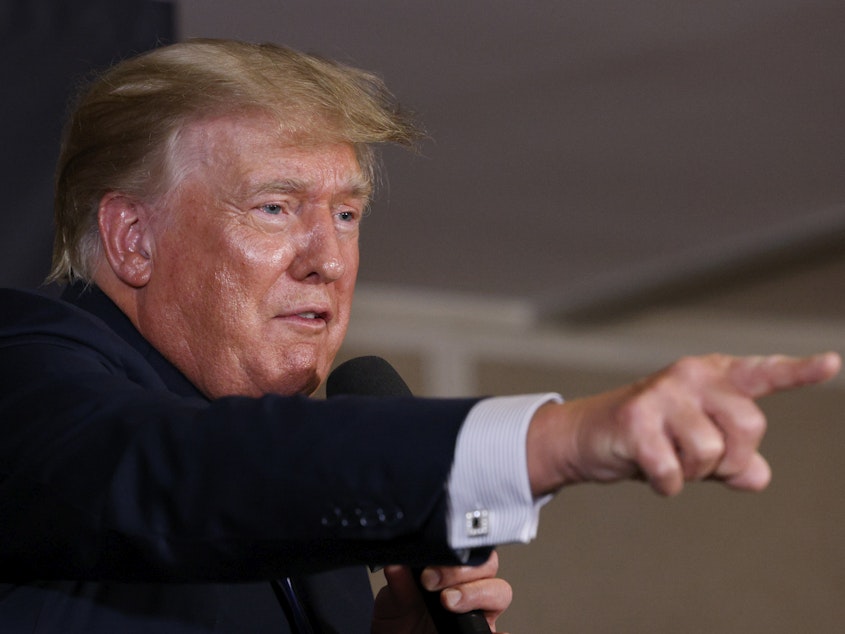Trump Sues His Niece Mary And 'The New York Times' Over Tax Return Stories

Former President Donald Trump has sued The New York Times and several of its reporters, along with one of its key sources — his niece — for obtaining tens of thousands of pages of his tax documents for an investigation into his finances that won a Pulitzer Prize.
The articles, published in October 2018, concluded that Trump "participated in dubious tax schemes during the 1990s, including instances of outright fraud."
In a lawsuit filed in a New York state court in Dutchess County, the former president's attorneys allege that Times reporter Suzanne Craig urged Mary Trump to break a legally binding agreement to keep those documents private as part of a larger settlement over his father's estate. The other Times reporters sued for their involvement in the project were David Barstow and Russ Buettner.
The New York Times signaled it would not back down. "The Times's coverage of Donald Trump's taxes helped inform citizens through meticulous reporting on a subject of overriding public interest," spokesperson Danielle Rhoades-Ha said in a statement shared with NPR. "This lawsuit is an attempt to silence independent news organizations and we plan to vigorously defend against it."
While Trump has threatened The Times with lawsuits in the past, it is the first time he has sued the paper in his name. The Trump campaign sued The Times last year. That case was dismissed this year.
Sponsored
Mary Trump's attorney, Theodore Boutrous, called the lawsuit "frivolous" and part of a pattern of targeting "truthful speech and important journalism on issues of public concern."
"It is doomed to failure like the rest of his baseless efforts to chill freedom of speech and of the press," Boutrous said.
Mary Trump was more blunt, calling her uncle a "loser" in a response to The Daily Beast, which first reported the filing of the lawsuit. "He is going to throw anything against the wall he can," Mary Trump told The Daily Beast of her uncle's suit. "It's desperation."
She became outspoken with her criticism of Donald Trump during his presidency. And she confirmed that she had been a source of the documents for Craig and her colleagues in her bestselling 2020 book about Trump, Too Much And Never Enough: How My Family Created the World's Most Dangerous Man, as well as in a podcast for The Daily Beast in February.
In the lawsuit filed Tuesday, Donald Trump's attorneys claim that Craig and her Times colleagues had actively urged — that is, "procured" — Mary Trump's search for the then-president's past financial documents, purportedly putting the newspaper on the hook legally for his niece's alleged violation of a legal pact to keep them confidential.
Sponsored
That agreement stemmed from an earlier settlement of Mary Trump's challenge of the will of her grandfather Fred, father of the former president. Last year, she went to court to sue Donald Trump and two of his siblings, saying they conspired to cheat her of tens of millions of dollars. That suit is ongoing.
Trump's lawyers also allege the reporters were "motivated, at least in part" by actual malice toward the former president. The phrase "actual malice" packs a punch because it is one of the standards used to help determine whether journalists should pay damages over publishing false and libelous claims about public officials or public figures.
Yet Trump made no claims of libel or defamation against the paper or Mary Trump in the suit. At the heart of this case are a breach of contract allegation against Mary Trump and a claim of tortious interference against The Times and its reporters — that is, that the newspaper knew it was explicitly seeking Trump's niece to break her confidentiality agreement. Trump did not specify how the article harmed his fortunes.
A judge previously ruled that the confidentiality pact was too vaguely worded to prevent Mary Trump from publishing her book and that her publisher, Simon & Schuster, was not bound by it anyway.
The courts have typically given news outlets broad latitude to report on the private affairs of elected officials on the grounds that the public deserves to understand the people in whom they invest public powers. [Copyright 2021 NPR]



